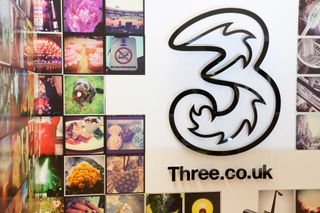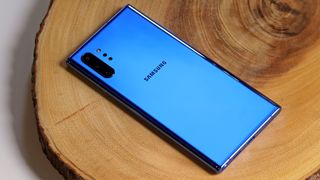Three 5G Rollout: Locations, Phones, Price and More
How Three plans to show up its UK rivals

UPDATE: August 19 - Three has now begun the rollout of its network, starting with home broadband in London. We have added new information about the launch and the service below.
Appropriately enough, Three has become the third 5G network to launch in the UK, coming in after EE and Vodafone. It’s looking as if the new network will be off to a slow start, but Three can instead attract people to its services based on future potential rather than immediate capability.
Read more about Three's 5G plans, including what phones it will offer and how much it will charge for 5G service.
Three 5G Cities: Where you can get it first
Three launched its 5G network in London on August 19, in the form of 5G home broadband. Since the 5G router works on mobile signal, you don’t need an engineer or an ethernet connection to set it up, just a plug socket to give it power. It also means you can move it around between locations easily, even to a different house (assuming you remain within the 5G area, which you can check on Three’s website).
It costs £35 a month for a 12 month 5G contract (there’s no landline rental cost included), and you get unlimited data to boot. If you’re impatient, you can pay £20 if you want it delivered on the same day, otherwise it arrives the day after you’ve ordered it.
The initial coverage at launch is disappointing, as it’s only one city (London) so far, and doesn’t include 5G SIMs. However, Three promises to have 5G mobile and broadband available by the end of the year in Birmingham, Bolton, Bradford, Brighton, Bristol, Cardiff, Coventry, Derby, Edinburgh, Glasgow, Hull, Leeds, Leicester, Liverpool, Manchester, Middlesbrough, Milton Keynes, Nottingham, Reading, Rotherham, Sheffield, Slough, Sunderland and Wolverhampton. Adding London makes for a total of 25 cities, the largest number of locations by the end of 2019 promised by any carrier’s announcements so far.
How fast will Three 5G be?
Currently Three has made no claims to the exact speed of its 5G network, but it does assert that it will be twice as fast as its rivals. For reference, the 5G download speed EE and Vodafone are promising is 150Mbps average speed, and 1Gbps max.
Three's 'True 5G'
Three is boldly asserting that it is the only "true" 5G provider according to the IMT-2020 standard, set down by the International Telecommunication Union, an agency that’s part of the United Nations.
To briefly sum up, this standard is what telecoms companies around the world are aiming to have in place for their 5G networks in 2020. Most carriers, including EE and Vodafone, are launching with a 4G/5G hybrid service to make the transition period easier, rather than launching straight into a fully completed network which would take far longer to set up.
Three is able to make the "true 5G" claim because of its secret weapon — its 5G spectrum holdings. When UK communications regulator Ofcom auctioned the rights to use different 5G radio frequencies to the telecoms companies (so nobody would end up clashing by using the same frequencies), Three bought an enormous quantity, more than twice as much as the next closest carrier, and that amount contains within it 100MHz of contiguous spectrum (adjacent frequencies).
With the IMT-2020 Minimum Technical Performance Requirements listing 100MHz as the minimum contiguous quantity for delivering a 5G network, it means Three has this base covered far in advance of its rivals, which is a significant early advantage.
The larger quantity of bandwidth means in theory that you’ll have greater reliability and speed when using 5G on a Three phone than anyone else’s, as there’s more chance of finding and holding onto a signal frequency that you can use. Only time and additional launches will tell if this strategy has paid off.
MORE: 5G Phones: Every Known Phone and Release Date
Three’s first 5G phones

Currently Three’s announced only two phones coming to its network — the Huawei Mate 20 X 5G and the Samsung Galaxy Note 10 Plus 5G. There are more due to come according to Three’s website, but this is all we have for the moment.
If you’re after a router instead of a smartphone, then Three has its 5G Home Broadband plan. Launching in August, this uses 5G signals to give high speed internet to whatever device you connect to it, and without needing an ethernet connection like traditional routers.
What you’ll pay for Three 5G
All of Three’s Mate 20 X plans come with a free M Pen stylus on any contract. Unlike other carriers, Three offers both a pay as you go option, which costs £999.99 for the handset, then a £10 minimum initial top-up, and a £90 a month option with no up-front cost. They’re certainly unique plans, but maybe they’ll suit some potential customers just right.
As for the normal contracts, it’s a choice between 4GB, 12GB, 30GB or unlimited data per month, all costing £79 upfront, and between £48 and £61 a month for 24 months. Notably the unlimited data option is currently at half price for six months, down from £61 to £30.50, which makes this a great deal if you’re interested in the Mate 20 X.

Meanwhile, the Galaxy Note 10 Plus 5G is currently available for pre-order only. As with the Mate 20 X, you can get the handset for £1099.99 on a PAYG rate, or for £97 a month without an up-front cost. For standard contracts, it’s the same range between 4GB, 12GB or 30GB, or unlimited data, from £63 to £78 a month with a £29 upfront fee.
All of these contracts come with free roaming in 71 countries, and the 12GB data/month and up plans also have Three’s Go Binge feature, which doesn’t count the use of data in certain apps toward your monthly limit. That's great if you’re a power user of Netflix, Snapchat, Soundcloud or Apple Music.
Outlook
What Three is promising looks interesting. There’s only two phones to choose from so far, but the variety of contracts and included benefits should fit a wide range of people.
Three's initial launch may be tiny, but if the carrier does manage all 25 cities on its list by the end of 2019, and its promises about having the fastest and most reliable signal of all UK carriers hold true, then Three could be the carrier to beat going into 2020.
Sign up to get the BEST of Tom’s Guide direct to your inbox.
Upgrade your life with a daily dose of the biggest tech news, lifestyle hacks and our curated analysis. Be the first to know about cutting-edge gadgets and the hottest deals.

Richard is based in London, covering news, reviews and how-tos for phones, tablets, gaming, and whatever else people need advice on. Following on from his MA in Magazine Journalism at the University of Sheffield, he's also written for WIRED U.K., The Register and Creative Bloq. When not at work, he's likely thinking about how to brew the perfect cup of specialty coffee.
